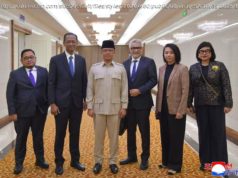Denuclearization is one of the first words that comes to mind when discussing diplomatic efforts on the Korean Peninsula.
What the United States means
Over the past decade, United States and South Korea have had one clear goal when it comes to denuclearization in North Korea: CVID — complete, verifiable, irreversible dismantlement of Pyongyang’s program.
«Irreversible,» in the practical sense, aims to ensure the current facilities cannot be reactivated after they’ve been dismantled.
The language dates as far back as October 2006 and has been used consistently by the United Nations Security Council in its resolutions condemning North Korea.
Experts said any denuclearization deal with Pyongyang would have to include allowing observers inside the country to check on North Korea’s progress, which would likely take place in a series of verifiable steps.
Inspections could be carried out by an international body such as the International Atomic Energy Agency (IAEA) whose inspectors were previously expelled by North Korea in 2002
For decades, the US and South Korea have pushed for denuclearization in North Korea.
In 1991, Pyongyang joined Seoul in signing a «joint declaration of the Denuclearization of the Korean Peninsula.» Two years later, North Korea pledged it would dismantle its nuclear program in exchange for international aid.
But every time promises weren’t delivered and pledges not followed through on both sides, leading to disappointment and suspicion.
Still, the US government appeared hopeful the latest round of talks would be different, with US President Trump declaring there was now a «good chance» of denuclearization.
What North Korea means
When North Korean leader Kim Jong Un speaks about denuclearization in speeches or public statements, he doesn’t talk about Pyongyang dismantling its weapons.
He talks about denuclearization «on the Korean Peninsula.» For Kim and his country, the term denuclearization doesn’t just refer to Pyongyang’s stockpile, it means the whole Peninsula, including South Korea and its US troops.
Any removal of North Korea’s weapons would likely have to be in conjunction with a removal of US military forces from the South.
It isn’t even about nuclear weapons in South Korea — the US hasn’t stationed nuclear weapons in the country since 1992.
Instead experts say Kim considers the US presence on the Peninsula a nuclear threat, given Washington’s huge stockpile of weaponry which would be deployed at a moment’s notice.
To ensure the safety of the regime in Pyongyang, the United States would have to back off as part of any denuclearization deal, something there is little indication they’d be willing to do.
The North Koreans feel they have good reason to want the United States as far away as possible before they even think about giving up their nuclear weapons.
In the early 2000s, Libyan dictator Moammar Gadhafi gave up his nuclear weapons in exchange for sanctions relief, only to be overthrown and killed by Washington-backed rebels years later.
US National Security Advisor John Bolton said in April Libya was a model for North Korea’s denuclearization, a statement later refuted by Trump.
In a May press statement published by North Korean state media, First Vice-Minister of Foreign Affairs Kim Kye-Gwan said their country would not accept the same denuclearization model as Libya.
«(The) world knows too well that our country is neither Libya nor Iraq, which have met miserable fate,» he said.






